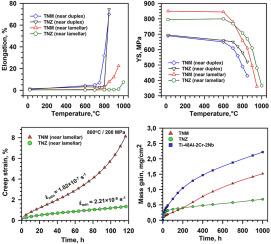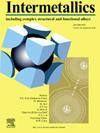β-凝固γ-TiAl基合金的微观结构、力学性能和抗氧化性
IF 4.3
2区 材料科学
Q2 CHEMISTRY, PHYSICAL
引用次数: 0
摘要
在本研究中,比较研究了两种β凝固γ-TiAl 金属间合金:Ti-43.5Al-4Nb-1Mo-0.1B (TNM) 和 Ti-43.5Al-6(Nb,Zr,Hf)-0.1B (TNZ) (at.%)。通过等温镦锻和两阶段热处理,每种合金获得了近双相和近薄片两种微观结构状态。显微组织检查发现,两种合金中都存在三相(γ、α2 和 β(βo)),但 TNZ 合金中的β(βo)相含量低于 1 Vol%,而 TNM 合金中的β(βo)相含量变化范围在 4-8 Vol%之间。两种合金的近双相条件相似,而 TNZ 合金的微观结构更为粗糙,接近片状结构。拉伸和蠕变试验表明,TNZ 合金的脆-韧性转变发生在较高的温度下,与 TNM 合金相比,TNZ 合金的抗蠕变性明显更高。与已知的γ-TiAl合金相比,TNZ合金在900-1000 °C的近层状条件下显示出更高的强度(例如,950 °C时的UTS = 554 MPa)。在 800 °C、1000 小时的暴露过程中,对合金在近层状条件下的抗氧化性进行了评估。TNZ 合金显示出更高的抗氧化性,因此其高温性能明显高于 TNM 合金。结果表明,合金的脆-韧性转变温度不同以及抗蠕变性和抗氧化性不同的根本原因在于 TNZ 合金的微观结构的热稳定性比 TNM 合金更强。本文章由计算机程序翻译,如有差异,请以英文原文为准。

Microstructure, mechanical properties and oxidation resistance of β-solidifying γ-TiAl based alloys
In the present work, two β-solidifying γ-TiAl based intermetallic alloys, Ti-43.5Al-4Nb-1Mo-0.1B (TNM) and Ti-43.5Al-6(Nb,Zr,Hf)-0.1B (TNZ) (at.%), have been comparatively studied. Two microstructural conditions per alloy, near duplex and near lamellar, were obtained in the alloys by isothermal upset forging and two-stage heat treatments. Microstructure examination revealed three phases (γ, α2 and β(βo)) in both alloys but in the TNZ alloy the β(βo) phase content was less than 1 vol% in contrast to the TNM alloy, in which the β(βo) phase content was varied within 4–8 vol%. The near duplex conditions of the alloys were similar, whereas a coarser microstructure was obtained in the TNZ alloy with near lamellar structure. The tensile and creep tests revealed that the brittle-ductile transition in the TNZ alloy occurred at higher temperatures that correlated with an appreciably higher creep resistance of the TNZ alloy as compared to the TNM alloy. In the near lamellar condition, the TNZ alloy showed superior strength at 900–1000 °C as compared to known γ-TiAl alloys (e.g. UTS = 554 MPa at 950 °C). The oxidation resistance of the alloys in the near lamellar conditions was evaluated during exposure at 800 °C for 1000 h. The TNZ alloy showed higher oxidation resistance and thus generally appreciably higher high-temperature capability than the TNM alloy. It has been shown that the fundamental reason for different temperatures of the brittle-ductile transition and different creep and oxidation resistance of the alloys is the enhanced thermal stability of the microstructure of the TNZ alloy compared to the TNM alloy.
求助全文
通过发布文献求助,成功后即可免费获取论文全文。
去求助
来源期刊

Intermetallics
工程技术-材料科学:综合
CiteScore
7.80
自引率
9.10%
发文量
291
审稿时长
37 days
期刊介绍:
This journal is a platform for publishing innovative research and overviews for advancing our understanding of the structure, property, and functionality of complex metallic alloys, including intermetallics, metallic glasses, and high entropy alloys.
The journal reports the science and engineering of metallic materials in the following aspects:
Theories and experiments which address the relationship between property and structure in all length scales.
Physical modeling and numerical simulations which provide a comprehensive understanding of experimental observations.
Stimulated methodologies to characterize the structure and chemistry of materials that correlate the properties.
Technological applications resulting from the understanding of property-structure relationship in materials.
Novel and cutting-edge results warranting rapid communication.
The journal also publishes special issues on selected topics and overviews by invitation only.
 求助内容:
求助内容: 应助结果提醒方式:
应助结果提醒方式:


